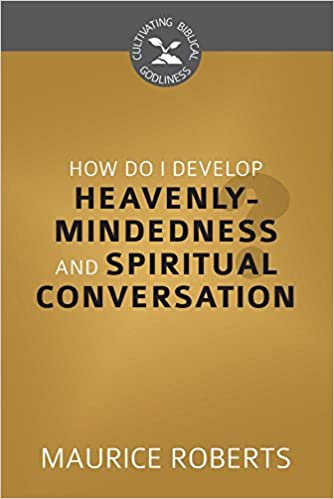A Book Review from Books At a Glance
by Hannah Miller
Roberts begins this booklet by discussing three ways Christians should live in this world. He states that Christians should live “with a conscious understanding of God’s existence and sovereignty” (1). That they should remember what Christ has done for them, and lastly, that they should live in the conviction that how God deals with the believer in the day-to-day is consistent with His Word. Roberts states that all Christians are heavenly-minded (1) but then describes how believers perhaps do not desire to grow in the ways they should.
The author describes heavenly-mindedness by stating that it is the “instinct of the soul by which careful Christians choose not what appeals to their fancy but what they know to be consistent with the honor and glory of God” (pp 3). Roberts seems well-intentioned and displays a deep desire for believers to cultivate their walk. Still, throughout the booklet, it becomes apparent that he is trying to use a different set of vocabulary for established principles in the Christian world. He admits this towards the end of the booklet, on page seventeen, when he goes into progressive sanctification. Roberts is seeking to convey that believers ought to look at their sanctification as something they are to be actively involved in, not something that passively happens. The idea of progressive sanctification is well-established in Christian literature. It may not be well understood or followed. Still, one is unsure how his booklet adds to the conversation instead of confusing the conversation with terms like heavenly-mindedness and spiritual conversation instead of progressive sanctification.
The second half of the booklet is about Spiritual Conversation. He overgeneralizes in saying spiritual conversation instead of calling the believer to act out of their progressive sanctification by using their words to encourage and build up those around them. He discusses spiritual conversation, but does not marry it with relationships with other believers. If one is in community with other believers, spiritual conversation should be a natural outpouring, not a script.
The overarching idea is that believers should keep heaven in mind and use that heavenly-mindedness to keep their conversations about the Scripture. His argument falls flat as he gives practical examples but fails to explain why those conversations are essential to the Christian. One can see a glimmer of what he seems to mean. He seems to indicate that believers should be in consistent spiritual conversation to work out their salvation and to help others work out their salvation. Roberts calls the believer not to shy away from these conversations and to be increasingly bold in speaking of the things of the Lord. He admirably does so, but again, if the argument were made to demonstrate not just that it is right to have these conversations but that they are for progressive sanctification, his point would have been more clear and convicting.
One more caution would be how Roberts compares believers. He is not wrong to reach those who are actively working on their sanctification and those who are not, but he does not give grace because there is a struggle for all believers, and it is not as simple as those who are and are not heavenly minded. He discusses those who are “less heavenly-minded” that they “compromise the faith of the Bible” (4) and, on page twelve, talks about the “best Christians.” This comes across as uncharitable towards the struggle for all believers, which is the struggle to work out one’s salvation every day.
Hannah Miller
Midwestern Baptist Theological Seminary
Buy the books

HOW DO I DEVELOP HEAVENLY-MINDEDNESS AND SPIRITUAL CONVERSATION, by Maurice Roberts